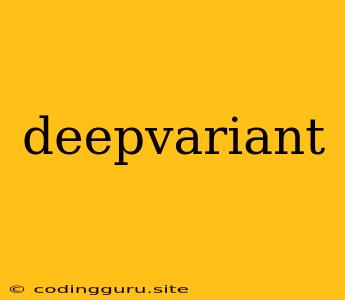DeepVariant: Revolutionizing Variant Calling with Deep Learning
In the realm of genomics, accurately identifying genetic variations, known as variants, is paramount for understanding disease mechanisms, tailoring personalized medicine, and unraveling the intricate tapestry of human evolution. Traditionally, variant calling has relied on algorithms based on statistical models and heuristics. However, the advent of deep learning has ushered in a new era, empowering researchers with sophisticated tools capable of deciphering the subtle nuances of genomic data with unparalleled precision. Among these groundbreaking tools, DeepVariant stands out as a shining beacon, leveraging the power of deep neural networks to revolutionize variant calling.
What is DeepVariant?
DeepVariant is a state-of-the-art variant caller developed by Google AI that harnesses the potential of deep learning to pinpoint genetic variations within DNA sequences. It employs a convolutional neural network architecture trained on massive datasets of sequenced genomes, enabling it to discern subtle patterns and distinguish true variants from sequencing errors.
Why DeepVariant?
The traditional variant callers, while commendable in their efforts, often struggle with certain challenges:
- Sensitivity: They may miss genuine variations, particularly those with low variant allele frequency.
- Specificity: They may misinterpret sequencing errors as true variants, leading to false positives.
- Computational Cost: They can be computationally intensive, requiring substantial processing power and time.
DeepVariant addresses these shortcomings by offering:
- Enhanced Sensitivity: DeepVariant exhibits remarkable sensitivity, enabling it to detect even subtle variants that might escape conventional methods.
- Improved Specificity: It excels at filtering out spurious variants, minimizing the occurrence of false positives.
- Efficient Performance: DeepVariant boasts impressive computational efficiency, enabling faster processing of large datasets.
How Does DeepVariant Work?
DeepVariant operates on a multi-step process, each step meticulously designed to maximize accuracy and efficiency:
- Alignment: Raw sequencing reads are aligned to a reference genome using a suitable alignment tool, such as BWA or Bowtie2.
- Preprocessing: The aligned reads undergo preprocessing to generate features that are relevant to variant calling. These features include base quality scores, read depth, and alignment quality.
- Deep Learning Model: The processed features are fed into a deep convolutional neural network trained on a vast dataset of sequenced genomes. This network learns complex patterns within the data and predicts the likelihood of each position harboring a variant.
- Variant Calling: Based on the predicted probabilities, DeepVariant assigns a genotype (homozygous reference, heterozygous, or homozygous variant) to each position.
Benefits of DeepVariant:
- Improved Accuracy: DeepVariant's deep learning architecture enables it to achieve superior accuracy in variant calling, surpassing traditional methods in both sensitivity and specificity.
- Reduced False Positives: By leveraging the power of neural networks, DeepVariant effectively filters out sequencing errors, reducing the number of false positives and providing a more reliable set of variants.
- Scalability: DeepVariant is designed to handle large datasets efficiently, making it suitable for large-scale genomic studies.
- Open Source: Being open-source, DeepVariant allows researchers to customize and extend its functionality, fostering collaboration and innovation in genomics.
Applications of DeepVariant:
DeepVariant has numerous applications in genomics research and clinical settings:
- Disease Research: Identifying genetic variations associated with specific diseases, providing insights into their underlying mechanisms.
- Personalized Medicine: Tailoring treatment plans based on an individual's genetic profile, enabling more effective and targeted therapies.
- Population Genomics: Studying genetic diversity across populations, shedding light on human evolution and disease susceptibility.
- Cancer Genomics: Detecting somatic mutations in tumor cells, aiding in diagnosis, prognosis, and treatment decisions.
Conclusion:
DeepVariant stands as a testament to the transformative power of deep learning in genomics. Its exceptional accuracy, efficiency, and flexibility make it an indispensable tool for researchers seeking to unravel the intricate complexities of the human genome. By leveraging the power of deep neural networks, DeepVariant is poised to unlock new frontiers in personalized medicine, disease research, and the understanding of human evolution.
